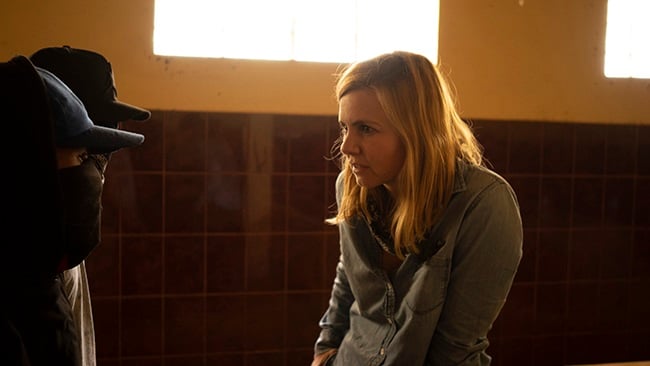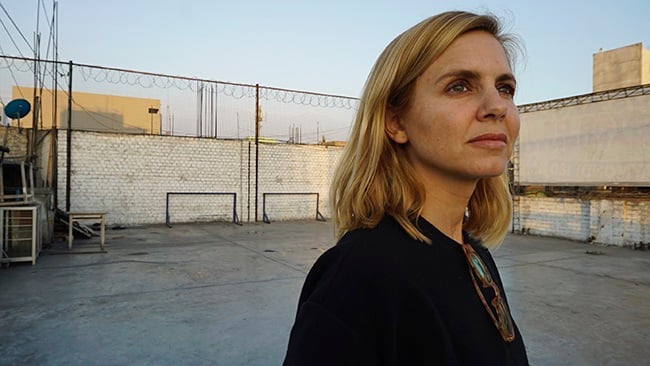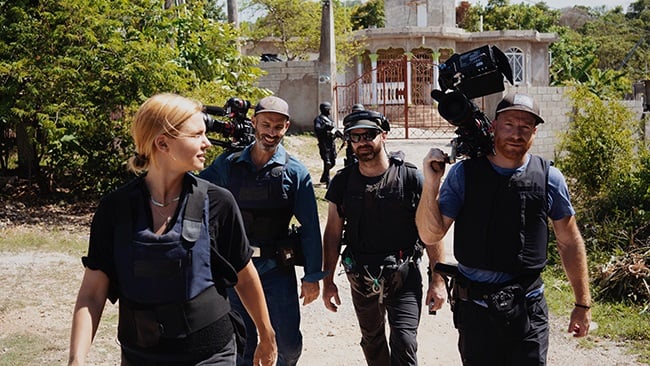
With unprecedented access to the most dangerous places and people in the world, Mariana van Zeller goes where nobody else dares to set foot. Joined by her camera crew, this award-winning journalist goes behind the curtain of the most rarely seen underground economies and meets with everyone, including tiger traffickers, international scammers, counterfeiters, gunrunners, and fentanyl suppliers. In a one-on-one interview with News24 Lifestyle Editor Herman Eloff, Mariana reveals how she wins the trust of those she works with, from ex-cons to law enforcement officers in her National Geographic docuseries, Trafficked.
I bought my first packet of cigarettes a short few months into my first ever job as a journalist. I'd successfully traversed adolescence without giving in to temptation, but one afternoon as a fresh-faced crime reporter I was returning home from a gruesome scene and knew what I had to do. I asked the teller for a packet of Peter Stuyvesant and a red lighter. I chose Peter Stuyvesant because a guy I knew smoked them and he always looked so damn cool, laidback and in control. I desperately needed some of that.
The cigarettes, at the time, was a helpful coping mechanism for debriefing afterwards and surprisingly, even more useful in building relationships with police officers, paramedics, and firefighters. When you’ve just shared a traumatic experience and huddle together afterwards to have a smoke, you create a bond that I can't really explain to anyone else.
Thanks to Allen Carr, I easily quit smoking and instead of covering crimes scenes, I now cover crime shows.
It's this combination of both the past and present elements of my career that led me to interview Peabody and DuPont Award-winning journalist Mariana van Zeller. Her riveting National Geographic show, Trafficked with Mariana van Zeller had me gripped and filled with envy, but mostly heaps of respect for her professionalism and levelheadedness as she walks into extremely high-risk situations to tell the stories that others won't touch.
There's nothing more daunting than interviewing another journalist and a seasoned investigative one at that. Mariana has gone into underworlds that many won't even want to visit in their worst nightmares. In Trafficked, which airs over eight episodes on National Geographic, she explores some of the darkest corners of the world. From the Peruvian underworld where she meets the gangster who makes the best quality counterfeit money, to the black market for tigers and tiger parts, which is so secretive and dangerous that few have attempted to uncover its ugly details.
You'd expect someone with such a hardcore journalism background to perhaps be a bit hardened or distant. But not Mariana. Just like in the show, she is friendly, warm, and down to earth. When she speaks, it's with a confident calmness and when she listens, it's with understanding and genuine interest. These qualities undoubtedly make her the remarkable journalist that she is - one that can sit across from a masked underground gang leader and stay absolutely calm when he says on camera, without a hint of irony: "You know, I was going to rob you and your crew today. But I won't. You're actually very nice, Mariana." (Gulp!)
'Between fear and curiosity, curiosity always wins'
It's one of the first things I ask her about when we start talking.
"We'd been warned that this was a dangerous man that runs this scamming operation and has people under him working for him," Mariana tells me one afternoon at the end of 2020 over a Zoom conversation.
"We got there, and his bodyguards were armed. First thing I do every time is I go there, I introduce myself, and I treat people with respect and equally. Whoever they are. I treat everyone equally. I'm also showing them that I'm not there to judge. I'm there to listen to their stories and to try and find a common ground, or empathy; to try and put myself in their shoes."
But how does she manage to keep her composure? How do you breathe calmly when fear hangs over you like a thick, dark cloud of smoke?
"I would say I'm a very optimistic person in general. I've always been very optimistic, so I always see sort of the best outcomes instead of the worst. I always see the best in people as well and that really helps."
The 44-year-old adds: "I'd say that in my head in a fight between fear and curiosity, curiosity always wins." I scribble her words in my notebook and circle them twice. Being curious but cautious is the thin line journalists walk every day.
"Sometimes that's a good thing and sometimes it's not," she says with a smile, before adding: "But I also think there's what you don't see in the show. It's all the months and months of pre-planning and the training that we get. Everyone who works on the show gets hostile environment training. There's a lot of planning to make sure that we minimise the risk because obviously, no story is worth a life.
"But I do think that if you trust the people that you are with and you respect them, even people who are considered the most dangerous people in our society - I'm a true believer and I've seen it happening again and again - they will trust and respect you back. It goes a long, long way."
To gain trust and access to these secret worlds Mariana often has to go on "first dates" - not your average kind of first date: "It's this first time that we meet. Sometimes with the crew. Sometimes just me. I call them underworld first dates. A lot of the times there's these drinking games involved and it's all just about building trust and getting to know each other. They want to know me and see if they can trust me as a journalist."
I share my anecdote about smoking and how it actually helped me to gain trust when working on a scene. Mariana confirms that cigarettes are a real important tool in the career of a reporter hoping to gain trust: "Every time. That's the first thing I do. I see they're smoking, I ask them: 'Can I grab a cigarette?’' It breaks down barriers immediately. It puts you on their level. It's so funny you say that."
'Black markets have exploded during Covid'
There's that and the fact that Mariana is fluent in Portuguese, English, Spanish, Italian, French, and can also speak some Arabic. "Yes, it helps that I speak a lot of languages. It helps that I have a lot of experience working in these worlds for many years, so I have connections and contacts all around. Then I think it helps the way that I approach the people I am talking to – which is [to show them that] I'm here to listen, I'm not here to judge."
She adds: "It's about gaining perspective of the world around us. I think that's one of the most privileged parts of my job, just being able to have a front row seat to the rest of the world and to gain access into these very dark corners of the world and how much that has given me perspective and changed my own outlook about the world itself."
Mariana is married to Darren Foster, an award-winning journalist and outstanding filmmaker himself. I'm curious to know more about their dynamic and how they deal with the dangers that come with the job.
"We've travelled all around the world together. I'll tell you a snippet about a story with my husband that will tell you a lot about the relationship that we have and who he is," she says with a smile on her face.
"I was doing a fentanyl story and I was in Sinaloa and I had gained access finally to this fentanyl lab and the people who were giving me access told me, the only way you'll be able to film this is that we'll have to pick you up in the middle of the night. We're going to have to blindfold you, and take you there."
"I called my husband and I said this is happening, it's happening in the middle of the night. What do you think I should do? And he said: 'We'll just make sure the cameraman films you as they are blindfolding you because that's really good television'. We're both journalists at heart and we know what's important to tell a story," she says laughing.
Mariana's job is already dangerous enough, and Covid-19 has added a new level to it. Being a global investigative journalist during a worldwide pandemic isn't easy but what Mariana has found over these last few months is something few people might be aware of. Above ground the world might have shut down, but underneath a storm is brewing.
"It's so interesting. We stopped filming Season 1 back in February, just before quarantine and we continued in post-production and we've been filming Season 2 since July.
"What has happened that I wasn't aware of until I hit the ground is that black markets have exploded during Covid. Whenever there's an economic downturn, whenever people have a hard time making money for their survival and their families they turn to black markets. I realised that a show like this is more relevant than ever. Because really there's been an enormous rise in black markets, whether it's drugs, steroids, sex trafficking, you name it. It's really risen."
I quickly agree and share with her how illegal cigarette sales skyrocketed during our hard lockdown and how the illegal tobacco trade blossomed like weeds in pavement cracks.
"Really? Is that true?" Mariana asks with instinctive curiosity, before adding: "Maybe that could be our next break? Where are they coming from?"
"I have no idea,"" I reply.
"I'll find out," she says without any hint of hesitation.
Watch the trailer here:
Trafficked with Mariana van Zeller premieres at 21:00 (CAT) on Thursday, 21 January 2021 on National Geographic.
- Mariana van Zeller's 2016 Fusion investigation Death by Fentanyl, which tracked the pharmaceutical and clandestine sources of the deadly opioid, was recently honoured with a DuPont Award.
- For her report Rape on the Reservation, which examined the increased incidences of rape and sexual violence on American Indian reservations, she received the prestigious Livingston Award for Young Journalists.
- Her documentary on prescription drug abuse and pill trafficking, The OxyContin Express, was honoured with a Peabody Award, a Television Academy Honour and an Emmy nomination.
- In 2011, Mariana began her coverage of the drug war in Mexico and for years, she attempted to interview drug lord Joaquin "El Chapo" Guzman, only to be scooped by Sean Penn. As a consolation, Penn reported that he and Guzman discussed Mariana's 2015 documentary, Chasing El Chapo.
- Mariana hosted Travel Channel’s Breaking Borders, where she journeyed to conflict zones around the world with acclaimed chef Michael Voltaggio.
- She currently contributes to National Geographic Explorer, Fusion, and ESPN. Mariana began her journalism career in her native Portugal.
(Source: National Geographic)




 Publications
Publications
 Partners
Partners














